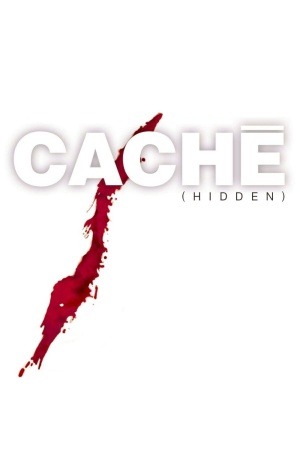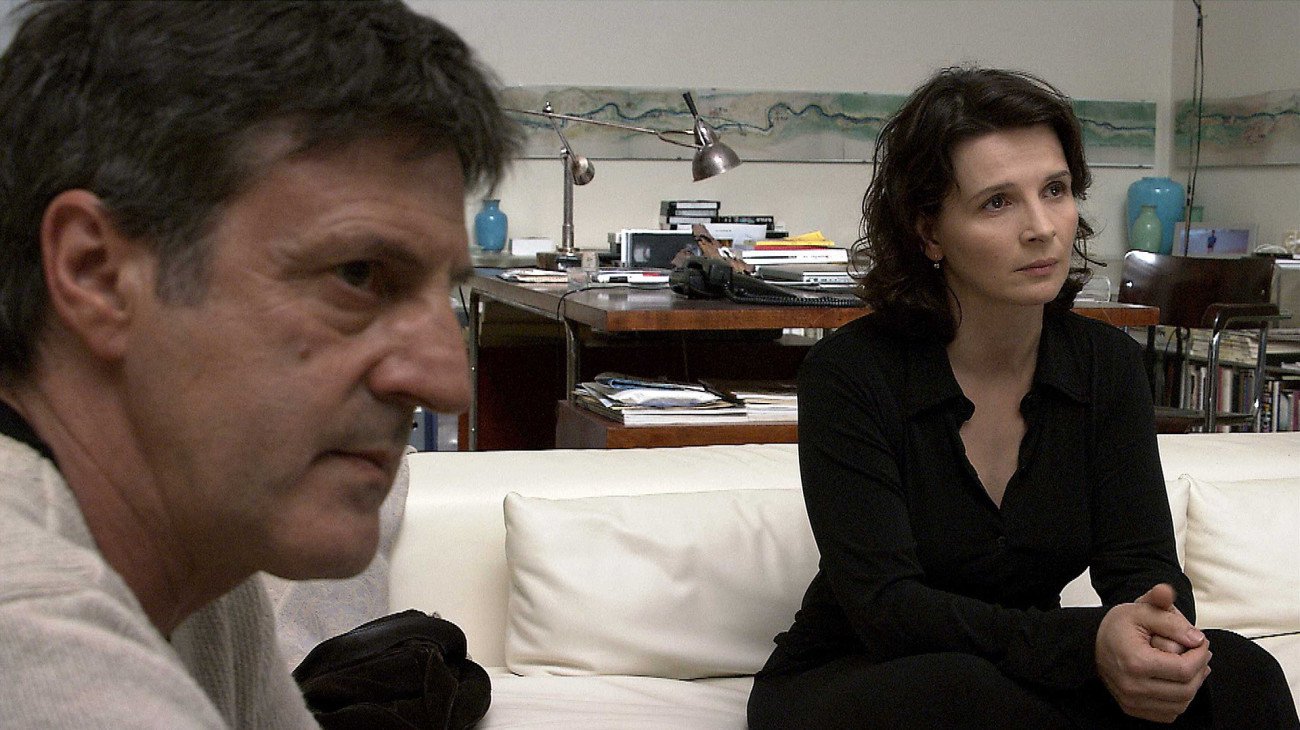
Hey audience, fuck you
Over the weekend, I managed to catch Michael Haneke's Caché, nominally a thriller, and quite the darling at Cannes. When I first saw it, I failed entirely to understand why it's been receiving so much adulation, although as I've considered the film I find that it yields increasing rewards. It is frustrating in many respects - I have not seen a film all year that makes its audience work harder - but I find myself beginning to respect it more as time passes.
The plot barely exists: Georges and Anne (Daniel Auteuil & Juliette Binoche) keep receiving video tapes on their front porch. These tapes are not threatening, but profoundly disturbing: they show the couple's house, taken from an outdoor position in the alley across the street. They attempt to discover why. Along the way, Georges makes a discovery that may or may not connect the tapes to a traumatic event from his childhood, and position the tapes as a form of revenge torture.
Nothing is resolved; and the final shot, which at first seems open-ended, contains a secret that makes the entire plot harder to comprehend, not easier (I'm not about to describe, even vaguely, what that might be - see the film). But it couldn't possibly be any other way: the film raises the question of how we make sense of anything, no matter how seemingly logical it may seem at first blush. For example: as nearly every review has mentioned, the film opens with an establishing shot of the house, holding for an eternity, with an occasional passerby walking through the frame. It's only after a few minutes that we hear Georges and Anne talking; it is another moment before we realize that we are watching the same video they are. Haneke returns to this shot throughout the film, but it is almost never contextualized as being a "real" establishing shot, or one of the videos the couple is recieving. This eventually spreads to many other shots, perhaps even most of them, and we begin to lose track of what is surveillance and what is the movie.
This aspect of the film has lead many critics to suggest (usually in praise) that it is an assault against the audience. I initially found this to be a spurious claim; the explicit connection between voyeurism and the cinema is at least as old as Rear Window, and no-one has ever complained that Hitchcock was trying to abuse his viewers. Except, Caché ups the ante with a theme derived from the idea of voyeurism, but at an angle to it: the relationship of image, representation and memory. I can't explain how this works without giving away more of the events in the film than I feel comfortable with, but the film concerns itself with how the images rip away the psychological scars covering old traumas (these traumas are both personal and societal, and there is a racial element to the plot that makes the film seem eerily predictive of the recent Paris riots).
Because the film is so insistent upon blurring the distinction between the viewer and the characters (especially Georges), there is a degree to which the film traumatizes the viewer. By this I mean, it draws us into the position of experiencing the psychologically damaging aspects of the film for ourselves. It does not do so by identification (as an American film might be expected to), but by calling into question our complicity in watching - if in Rear Window, we were looking over Jimmy Stewart's shoulder, and therefore our morality was contingent upon his actions, here we are in his position, and our viewing is considerably more exploitative (recall, our motivation in watching this film was to see a "thriller"). One moment in particular draws this out: towards the end, one character tells another that they needed to meet in person because "I wanted you to see this." That is, you must not see this on a videotape. And thereafter, the most shocking moment in the entire film, one that had every person in the theatre I saw the film at gasp collectively - and none of us "saw" it. We had the same mediation that the character specifically did not want the moment to have.
It's an extraordinarily difficult film (when I think of all I haven't even touched on - the marital strife, the constant droning of televisions, Georges' job as a TV talking head - I am amazed again), and some might even say it's unpleasant. But it's insidious, there's no denying: it crawled into my brain and sat there bubbling, and it bubbles still. This is one of the most unsettling films of 2005.
The plot barely exists: Georges and Anne (Daniel Auteuil & Juliette Binoche) keep receiving video tapes on their front porch. These tapes are not threatening, but profoundly disturbing: they show the couple's house, taken from an outdoor position in the alley across the street. They attempt to discover why. Along the way, Georges makes a discovery that may or may not connect the tapes to a traumatic event from his childhood, and position the tapes as a form of revenge torture.
Nothing is resolved; and the final shot, which at first seems open-ended, contains a secret that makes the entire plot harder to comprehend, not easier (I'm not about to describe, even vaguely, what that might be - see the film). But it couldn't possibly be any other way: the film raises the question of how we make sense of anything, no matter how seemingly logical it may seem at first blush. For example: as nearly every review has mentioned, the film opens with an establishing shot of the house, holding for an eternity, with an occasional passerby walking through the frame. It's only after a few minutes that we hear Georges and Anne talking; it is another moment before we realize that we are watching the same video they are. Haneke returns to this shot throughout the film, but it is almost never contextualized as being a "real" establishing shot, or one of the videos the couple is recieving. This eventually spreads to many other shots, perhaps even most of them, and we begin to lose track of what is surveillance and what is the movie.
This aspect of the film has lead many critics to suggest (usually in praise) that it is an assault against the audience. I initially found this to be a spurious claim; the explicit connection between voyeurism and the cinema is at least as old as Rear Window, and no-one has ever complained that Hitchcock was trying to abuse his viewers. Except, Caché ups the ante with a theme derived from the idea of voyeurism, but at an angle to it: the relationship of image, representation and memory. I can't explain how this works without giving away more of the events in the film than I feel comfortable with, but the film concerns itself with how the images rip away the psychological scars covering old traumas (these traumas are both personal and societal, and there is a racial element to the plot that makes the film seem eerily predictive of the recent Paris riots).
Because the film is so insistent upon blurring the distinction between the viewer and the characters (especially Georges), there is a degree to which the film traumatizes the viewer. By this I mean, it draws us into the position of experiencing the psychologically damaging aspects of the film for ourselves. It does not do so by identification (as an American film might be expected to), but by calling into question our complicity in watching - if in Rear Window, we were looking over Jimmy Stewart's shoulder, and therefore our morality was contingent upon his actions, here we are in his position, and our viewing is considerably more exploitative (recall, our motivation in watching this film was to see a "thriller"). One moment in particular draws this out: towards the end, one character tells another that they needed to meet in person because "I wanted you to see this." That is, you must not see this on a videotape. And thereafter, the most shocking moment in the entire film, one that had every person in the theatre I saw the film at gasp collectively - and none of us "saw" it. We had the same mediation that the character specifically did not want the moment to have.
It's an extraordinarily difficult film (when I think of all I haven't even touched on - the marital strife, the constant droning of televisions, Georges' job as a TV talking head - I am amazed again), and some might even say it's unpleasant. But it's insidious, there's no denying: it crawled into my brain and sat there bubbling, and it bubbles still. This is one of the most unsettling films of 2005.






